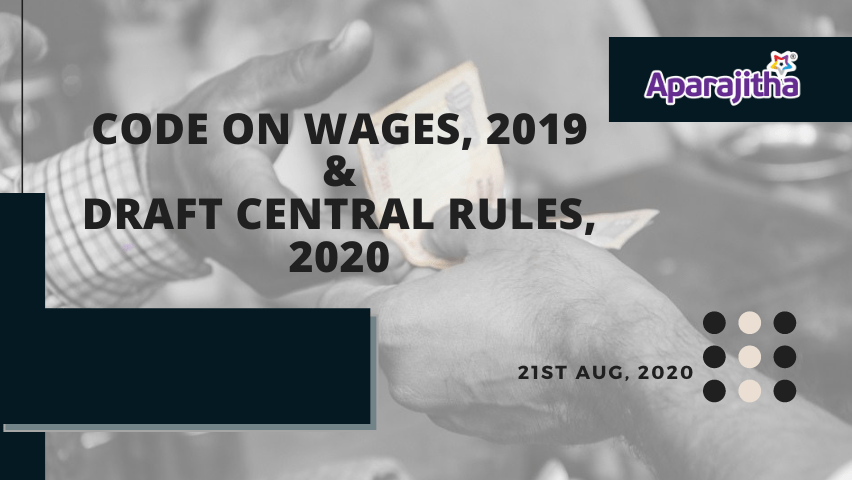Finally, the new Code on Wages, 2019 which aims to amend and consolidate the existing four legislations, viz., The Equal Remuneration Act, The Minimum Wages Act, The Payment of Bonus Act and The Payment of Wages Act has been published on 8th August 2019 and Central Draft Rules has been published in Official Gazette dated 7th July 2020 by Ministry of Labour Department with the view of supersession of the existing eight Central Rules pertaining to Wages and Bonus and related matters connected therewith.
Code makes provision for application of minimum wages to all employees/workers in both informal and formal sector which is a welcome one. It provides for floor wage for different geographical areas so as to ensure that no State Government fixes the minimum wage below the floor wage notified for that area by the Central Government. One of the Objectives of the bill is into, a consolidation of register maintenance from the multifold registers and one unified submission of return would be framed in the Rules by respective appropriate Government. In case of employers having branches in multiple States, they have to maintain and submit the return, in the format would be prescribed under the State specific Rules which are yet to be framed by the respective State.
In respect of wages, Code mandates that the employer should fix 50% of wages as basic and DA which would equivalent with Minimum Wages, remaining may be the excluded components as specified in the definition of Wages in Section 2(y). Keeping this ‘wages’ definition, this could be considered just as a sounding bell to revisit the salary structure, if need be, in the light of minimum wages from the employer’s end once the code is commenced!!! Wages ceiling for the purpose of Bonus eligibility shall be fixed by the appropriate Government and this should cross verified with the substantive part of wages as referred in Section 2(y). Of course, there is no guideline for fixation of salary structure apart from protection of 50% of wages as minimum wages which include Basic and DA for the purpose of Bonus eligibility, also.
In terms of penalties, it 100 times enhanced and the default in payment not only rest with 10 time multifold wages with difference amount but the non-payment of bonus also has the same implication whereas currently it is not so.
We may recall that one of the tasks of 2nd National Commissioner on Labour, 2002 recommended rationalization by making laws more consistent with each other, less cumbersome, simpler, and more transparent. In addition the commission highlighted that need for pragmatism in the implementation of the Acts. Thus, this emphasis on considering the interest of all Stake holders in Labour Law domain!!!
To conclude by combining these four Acts, the code has aimed towards simplification. Moreover, the multitude of newly formed provisions in the Code has done justice towards making Labour Law more congenial for day to day and evolving needs of all sections. Moreover, the Code has taken the measures are surely benefitting the working class and rightly so. In terms of the employer, surely, they will be happy if the process of compliance is simplified; if the transactional burden is reduced; if the ambiguities are cleared and the enforcement wing plays an enabler. Aren’t they right in their expectations out of the long-awaited Labour codes? Fingers crossed!!!
Aparajitha India’s No.1 compliance management firm offers full compliance assurance covering all categories and regulations to help you navigate the last mile as well and helps you initiate, track and manage compliance online with our e-compliance platform – Compfie.
The domains which are incorporated in the Compfie to ascertain your compliance status and manage your e-compliance are Labour & Employment Law, Industrial Law, Environmental, Health & Safety related Law, Fiscal, Corporate and Commerical Law, Industry Special Law, Vendor Compliance Management, Vendor Compliance Certification.
To know more about the COVID 19 special relief, notification, scheme, and up-to-date compliance news and much more details subscribe to our daily compliance news bulletin.
Contact us at marteking@aparajitha.com for a free Compfie demo.
By
Team Aparajitha
Disclaimer: “The article represents the opinions of the author and the author is solely responsible for the facts, cases and legal or otherwise reproduced in the article”




